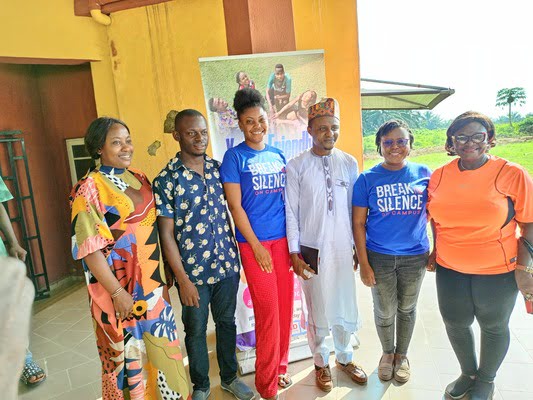A Civic Engagement Activity by Calabar EPLF Fellows: Grace Ibor, Freedom Bassey, Mfreke Asigbe, and Oyo Effiom.
In a bid to fulfill their Civic Engagement Activity, an exercise was carried out by Fellows of the Emerging Political Leadership Fellowship (EPLF): Grace Ibor, Freedom Bassey, Mfreke Asigbe, and Oyo Effiom. About 111 interviews were conducted with the University of Calabar Students of which 90 (81%) were females and males 21 (19%). These students and fellows of EPLF of The Bridge Leadership Foundation went further to participate in the civic dialogue with the panelists which included the SUG Vice president Obasi Chinansa Juliet.
The major objectives of the program were to assess the knowledge and perceptions of 100 students on the rudiments of identifying opportunities for the promotion of young women’s participation in politics and provide basic facts and justification for the need for young women to engage in politics.
The major highlights of the event were during the dialogue sessions in which participants bared their minds as it relates to women’s participation in politics. The malabresses and malabites along with the EPLF fellows had a robust discussion about the low representation of women in politics and leadership as a whole. Questions asked included: Why is politics seen as a dirty game? How can women win elections without having Godfathers? How can one lead without parental support?
The SUG Vice President Obasi Chinanza Juliet responded that politics is not a dirty game but that some persons that play politics are, she further added that it’s all about the individual’s mindset and the decision one takes on how to get involved. She also mentioned that it’s important for students to participate in Departmental, Faculty, and SUG activities, especially female students. She also stressed that the position of the class representative is not limited to male students but that female students can also handle the position better as most students get it all wrong at the foundation stage.
One of the EPLF fellows, Freedom Bassey also spoke on better representation of women’s voices as being key. He pointed out the low statistics of women as only 8 women are senators as compared to 101 male senators. For the Federal House of Assembly, he stated that out of 360 positions, only 22 women occupy these positions. For the deputy governorship position, only four out of the 36 are women. He stressed the fact that women are better leaders than men as they are more empathetic than men. He also admonished the female students to push for leadership positions.
Mfreke Asigbe one of EPLF fellows also spoke about closing the gender gap in politics. She stressed the need to close the gap which experts proposed can only be closed in the next 99 years despite numerous efforts. She admonished the female students to get political mentorship and get ready for leadership as most countries such as Rwanda have instituted that some positions (up to 30%) be reserved for women and that this will soon be tenable in Nigeria and other countries as well. She asked the students the question: How ready are you to occupy a leadership position? She informed the students that most seats are going to be left solely for women and that they must be ready. She went further to state that leadership is not a walk in the park and that it will test their resilience; hence they must build resilience and be prepared.
Grace Ibor, one of the EPLF fellows who anchored and moderated the event also responded to the question pertaining to not getting parental support by stating that this is one of the root causes of poor participation of women in politics. She stressed that everything about leadership begins at the home front where parents influence their wards and that this needs to be addressed. She informed the students that the Youth Friendly Hub has a counseling unit and that students should maximize this resource for the improvement of their interpersonal relationships, career relationships as well as leadership potentials and choices. She concluded by informing the students that the school management team stated that if 5 female students are willing to contest for the position of SUG President; then they will be sponsored. The students responded with a great shout of joy and happiness. The students were given refreshments and they expressed their satisfaction with the program as the program came to an end.
Outcomes
The participants stated that barriers that limit young women’s participation in politics are all related to the low status of women, low self-esteem, inequitable gender norms especially at the family level, and the general view (stereotype) that “politics is a game for men not women”. Integrating political and general civic participation sessions in existing students’ forums with the university will sustain continuous orientation on the subject. Gender norms especially at the family level impact the status of girls and subsequently, their participation in politics and governance. A majority of the target group does not see the need to reach out to their leaders at the political and community level for shared learning. Due to the varying lecture time for the students, a weekend may be preferable if longer periods are required for similar activities or lecture-free days.
Next Steps
As part of the way forward, Grace Ibor informed everyone that the dialogue sessions to foster civic participation will continue in the University of Calabar monthly with the support of the University of Calabar Youth Friendly Hub for an initial 12 months period. Students who indicated interest to run for the various SUG positions were assured of mentorship. It is recommended that there should be a continuous engagement of students and other young people on the subject of civic participation to make Nigeria a better country.

